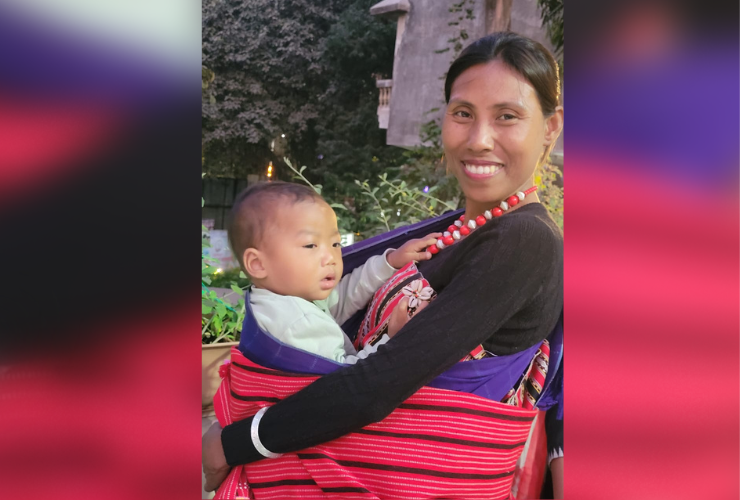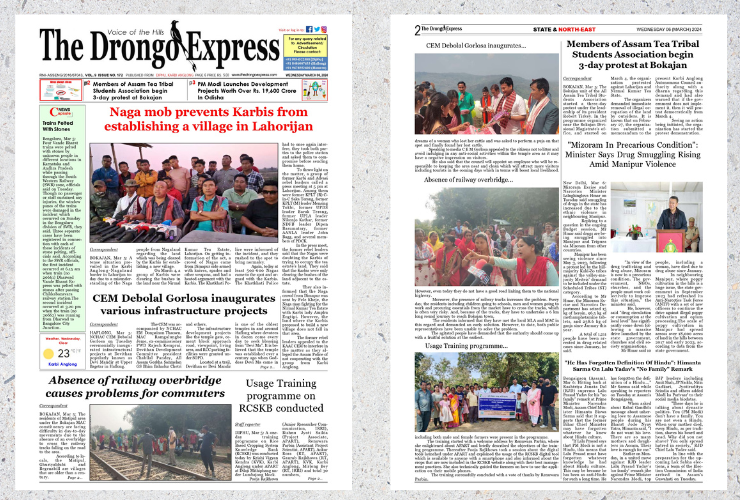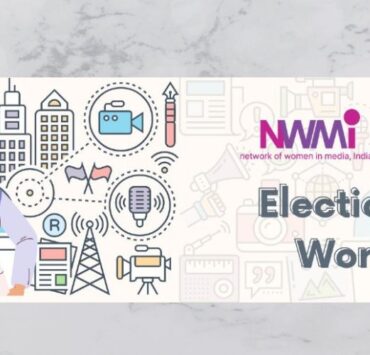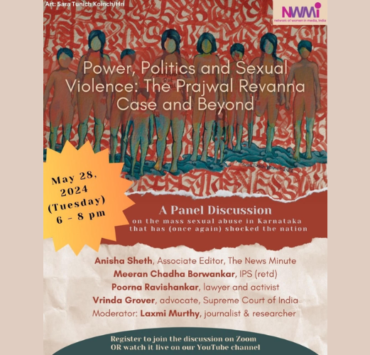
By Helvellyn Timungpi

At the NWMI meeting in Mumbai, February 2024. Photo courtesy: Supriya Unni Nair
Helvellyn Timungpi from Diphu, recipient of the Sixth NWMI Fellowship for Women Journalists shares highlights of her journey over the past year.
Karbi Anglong is an administrative district located in the state of Assam, India, and is one of the 34 districts in the state. Karbi Anglong and West Karbi Anglong district is the home of the Karbis (earlier known as Mikir), which is one of the major tribes of Assam after Bodos. I hail from West Karbi Anglong which was carved out of Karbi Anglong district in 2016. I am currently based in Diphu, the district’s headquarters.
I grew up in Umswai, a village on the Assam-Meghalaya plateau. Located along the border, the area has been a conflict zone for decades, and has had to face challenges like lack of development, mountainous terrain, poor connectivity etc, forcing people to migrate to more developed areas.
Apart from the Karbi, the district is home to different tribes like the Bodo, Dimasa, Rengma Naga, Tiwa, Kuki, Mizo Hmar, Paite, Tai Ahom, Khasi etc. The district is governed by the Karbi Anglong Autonomous Council, in accordance with the Sixth Schedule of the Constitution of India. The economy of the district is largely agriculture-based and the majority of the tribes depend on it for livelihood. Jhum cultivation is quite prominent here though people have shifted to cultivation of cash crops like broom grass, pineapple, orange, betel nut, betel leaf, turmeric, ginger, sesame, mustard etc.
Connecting with women journalists
I got in touch with the Network of Women for Media, India (NWMI) after being introduced by a very kind-hearted journalist, writer and humanitarian Rupa Chinai in 2019. I attended my first NWMI meet in 2020 in Bengaluru. Since then, there was no looking back. Before being introduced to the NWMI, I had very few female journalist friends and the only ones I know are those who worked in our district.
There were only three active women journalists, including myself. At the time, I was questioning myself about continuing with the profession. The salary I received from The Drongo Express, the media house where I worked, could not sustain my family. The living conditions in Karbi Anglong district are quite difficult and with the little money we (my husband and I) earned, we managed to send our eldest child to a private institution. We thought that we would be able to move on with our lives with our meagre earnings until Covid struck and the lockdown was declared soon after.
We still managed to work from home and the owner of the newspaper where I worked could still pay us salary, though the irregularity had set in by then. However, we somehow managed to survive. Things were very tough during the lockdown, during which we faced scarcity of both food and finances. I was pregnant with my second child. The baby was due in May 2021 and that was the time when the spread of Covid became worse, and the lockdown too. That was when NWMI members from Mumbai intervened. They accumulated enough funds for me to get myself admitted to a hospital. I gave birth to a beautiful girl, paid my hospital fees etc with the money sent by them and my family were surprised by the act of kindness carried out by these wonderful women.
We thought things were getting better. Lockdown was ending and we, like others began to go to office. We were struggling with salary issues, but we managed to survive somehow for another year and a half. That was when another bolt of lightning struck. The proprietor of the newspaper The Drongo Express where I had worked for the past six years suddenly called us one day to his home and declared that he would no longer run the business.
I was pregnant with my third baby then and I suddenly became unemployed, broke and lost. Though heavily pregnant, I approached several persons whom I thought I could trust, but very few responded to my pleas. Again, it was the women of NWMI who came to my rescue. I asked the proprietor of The Drongo Express if I could run the newspaper and he agreed. I decided to take matters into my own hands. With encouragement from some good people and of course the NWMI, my three colleagues and myself took the plunge and decided to carry the business forward for ourselves as well as some of our friends who would be unemployed like us if the business was closed down. Taking on the already bankrupt business was not an easy task. The Drongo Express had only Rs. 20,000 in its bank account. We were surviving from hand to mouth, and we had no computers, camera or office to continue with our work.

That was the time NWMI intervened again. Several members came forward to help me pay my child’s school fees, my delivery and even to put food on our table. The NWMI helped me get a laptop and camera and I could continue with my work. They contacted some friends from the Northeast who came forward to provide tables and chairs. Soon, other support came our way. A woman leader from our area got a room for us to use as an office and even paid the rent for three months.
Solidarity and support
Things started to look brighter when I was awarded the NWMI Fellowship. This fellowship was a life saver and a miracle to me and my family. We were surviving on my husband’s modest income then. And he was torn between taking care of my older children and our infant and I. Adding fuel to the already massive fire, my mom became very ill and she was referred to a hospital in Guwahati, more than 200 miles away from home. My father was a heart patient and I, the oldest sibling who was unemployed and had just given birth had to intervene.
I was at life’s darkest bottom when the NWMI became a beacon of light. The fellowship money was my bread and butter, my child’s tiffin, her pencils and pens, my second child’s baby food and my youngest baby’s tiny clothes and nappies. It was also the fuel to my small vehicle. I had to borrow some money at an interest rate of 15-20 per cent for basic needs before the NWMI intervention, and I managed to pay my debts back with the fellowship money. The fellowship helped me come out of a very dark and difficult phase of my life and I managed to carry myself, my family and The Drongo Express family forward.
Struggle for survival
Yet, despite the encouragement, I could not think of writing a story or carrying out any kind of assignment while simultaneously fighting for my survival and also my newspaper’s survival. But I do write poems and I have more than a hundred poems which I penned down in the last few years which I am now getting translated. It may take time and I have decided to dedicate this small and humble anthology to the NWMI. That is all I could think of at the moment. With three little ones running around all the time, I couldn’t dare to think of anything else!
Talking about The Drongo Express, things started to look brighter when we received a small sum of money from the Karbi Anglong Autonomous Council. The money was a long pending advertisement bill. However, we had to pay 40 per cent of our income to the advertisement manager and with the remaining money, we paid salaries to our staff. And since then, we have stopped receiving any money. We were looking forward to receiving some long pending advertisement bills, however, due to elections and declaration of the model code of conduct, not a single paise was deposited into our account. We have not been able pay salaries for more than six months, and the condition of The Drongo Express has not changed much.
I thank the NWMI for its solidarity, and all the members who contributed to the fellowship – they went out of their way to provide me with everything for the past one year. I am a believer and I do pray that god will surely bless those cheerful givers with all the happiness and prosperity because they do deserve it.
Read more about the fellowship and past recipients: NWMI Fellowship (nwmindia.org)
Listen to past NWMI fellows speak of their experience:




